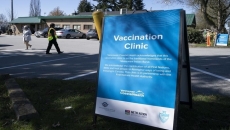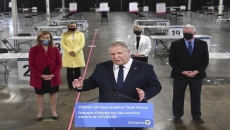Much of the taxpayer money that has funded oil well cleanup in Alberta may have simply replaced money that energy companies would have spent anyway, according to a new analysis.
That means the public is likely paying for private companies' pollution, says the report from the Parkland Institute, a research group headquartered at the University of Alberta.
"It's hard to say because the data is so limited," said Megan Egler, author of the institute's report. "But what I did find is highly, highly suggestive that this funding simply was just replacing the money that would have otherwise been spent by these oil and gas producers."
Last summer, the federal government announced $1.7 billion for the cleanup of unreclaimed oil and gas wells in Canada. Most of that money — $1 billion — went to Alberta, where the largest problem exists. The province's United Conservative government administered the funding.
Egler found that in 2019, Alberta's energy industry spent about $340 million on remediation as part of the province's area-based closure program, which represents about 70 per cent of Alberta's cleanup activity.
The following year, after the start of the federal funding, about $363 million was spent on such work in Alberta.
"I started looking at the spending in past years and it was more or less the same," Egler said.
Much company-funded remediation actually ended after the announcement of the federal program, said Egler.
"A lot of these companies actually stopped all their closure work."
As well, Egler said her research raises questions about which companies received the funding. Almost one-quarter of the $800 million that has so far been distributed went to just five companies, she said.
One of them, Canadian Natural Resources Limited, got more than $100 million. CNRL is a profitable company that recently beat analysts' revenue and dividend forecasts.
Egler notes that funding was not distributed on the basis of which wells had been unreclaimed the longest or which posed the greatest environmental threat. In fact, the first two funding periods were aimed at producers that could not afford the cleanup or were defaulting on landowner lease payments.
She said because Alberta would have already been likely to pick up the tab in those circumstances, the federal funding just transferred dollars from one government to another.
"The cleanup of these sites relieves both the defaulting owners and the government from paying compensation to landowners," says the report.
The program does seem to be close to meeting Alberta's job projections. It has funded more than 1,700 jobs so far, putting it on track to nearly achieve the province's goal.
But Egler points out there's no way to know if those jobs would have existed anyway. And she says they were expensive.
Each job took almost $190,000 in subsidies, she said. That's $41,000 more per job than similar work done by the Orphan Well Association.
"There has been no clear explanation from the government of Alberta why the public dollars to create one job are higher," the report says.
Nor was there any part of the program that measured its contribution to Canada's climate goals. Unremediated energy wells are a significant source of methane, a potent greenhouse gas.
Alberta Energy Minister Sonya Savage said the report contains inaccuracies, although she didn't say what they were.
"The report ... fails to reflect the significant progress made by Alberta's government on addressing a number of issues it identifies," she said in an email Wednesday.
"We are supporting the economic recovery by making use of Alberta's specialized oil and gas labour force at a time when they are in need of work."
Savage said the government works with industry and Indigenous groups to continuously improve the program.
But Egler said her report raises questions about the program that aren't being answered.
"One billion dollars cleaning up wells and providing employment — there's nothing wrong with that," she said.
"We could have had a program that spent the money better. It just ended up being a subsidy for oil and gas producers."
Photo courtesy of Istock.






